- Home
- Joy Dettman
Ripples on a Pond Page 16
Ripples on a Pond Read online
Page 16
*
Chris flew home the following Saturday, only for a night. They ate at a Melbourne restaurant, where, to turn the conversation away from her eight-hour marriage, she told him the MG was making a weird noise.
‘It’s like there’s a bird stuck in one of the wheels.’
He knew the law; didn’t know much about cars. He spoke about the case he was working on in Sydney, or mentioned that it should be done by Wednesday or Thursday. She would have been interested to hear the details but he never mentioned his clients’ names.
‘Promise me that you won’t contact Mum and Dad.’
‘You have an issue with trust, Cara,’ he said, and who was she to disagree with that?
LATE-NIGHT VISITOR
She trusted Barry Simpson. She dialled his number on Monday and told him about the squeaking bird stuck in one of her wheels.
‘Sounds like you’ve done a wheel bearing, love,’ Barry diagnosed.
He knew the MG intimately and spoke of its intricacies as some may speak of grandkids. He and Mary had no grandkids, no children to give them grandkids. Mary, struck down by polio in infancy, had trouble enough getting herself from sink to table.
That afternoon, when Cara delivered the car to Ashburton, she drank tea again in Mary’s kitchen; too late now to tell her she preferred coffee. Rain teeming down, she gave up her earlier intention of walking up to the tram stop. Called a taxi, then waited a long time for it to arrive. In Melbourne, everyone wanted a taxi on a wet night. It was no punishment waiting with Mary. Cara spoke of her brand-new, state-of-the-art, whiz-bang electric typewriter; and Mary spoke of her many years as a typist in a solicitor’s office. Before the taxi blasted its horn out front, Cara had told her about the novels she wrote and her dream of publication. Mary didn’t tell her how few made it to the publisher’s desk.
She got wet running to the taxi; and got wetter when he pulled up out front of the flat block and she ran again, rain thundering onto her umbrella. Shook it before she climbed the stairs, removed her headscarf and shook it, removed her overcoat and gave it a shake.
‘It’s wet enough out there without bringing it in here,’ a voice said.
‘It certainly is,’ Cara replied, glancing up to a small shape perched on the top step.
The voice had sounded remotely familiar. There were twelve dogboxes in the block, and the occupants arrived and left regularly. She was one of the few stay-puts. Four steps higher and she recognised Raelene. She’d seen her as a fifteen-year-old kid back in ’65 – a pretty, dark-headed gypsy of a kid with beautiful straight white teeth. She looked like a half-starved drowned rat crouched in a concrete drainpipe tonight. And what the hell was she doing here?
Forewarned is forearmed, Georgie had said. Steal the gold fillings from your teeth, she’d said.
Cara stood halfway up, halfway down those stairs, studying that girl, and seeing something feral in her heavy-lidded eyes, in her too-wide mouth, a sharpness, a shiftiness. It cancelled the gypsy pretty.
‘What can I do for you, Raelene?’
‘I wasn’t sure I remembered your address right until I saw you come in just now.’
‘I wasn’t aware I’d given you my address.’
‘Georgie gave it to me before I went up to Sydney. I came down on the train this morning, went into the station toilets to clean up a bit and someone knocked me over and took all of my stuff. Everything I owned was in my case.’
‘How did you get out here?’
‘A woman at the station gave me a dollar for the tram fare. I’m supposed to be on the bus home tonight.’
Forewarned is forearmed.
But what could she do? Stand all night on the cold steps staring at the girl? Put her coat back on and go somewhere else? If Morrie’s car had been in her bay she may have. But what could Raelene steal in that unit? No gold fillings; maybe five dollars’ worth of fifty-cent coins in a jam jar. Other than the ring on her finger, Cara owned little of value, so she continued upstairs and unlocked her door. Raelene followed her inside.
Hung the overcoat on a hook behind the door, left the umbrella to drip beside it, turned on the three-bar electric radiator, voracious drinker of electricity, and told Raelene to stand in front of it.
Escaped to her bedroom, knowing she shouldn’t have let her in; but having let her in, she needed to get her dry. Found a skirt she could live without and a well-worn sweater, a pair of briefs and the bra she’d bought when pregnant with Robin. Apart from her breasts, there was little of Raelene.
‘Have a shower and get yourself warm,’ she said, showing her to the bathroom, offering the clothing and an ex-Amberley towel. She owned better towels, but not for that girl. Washed by the afternoon’s cloudburst, there was still something unclean about her.
The bathroom door closed, Cara began the search for items of value. Her bankbook and chequebook lived in the middle drawer of her desk, with Morrie’s and Georgie’s letters. She used a rubber band to bind the lot together before placing them into a zip section of her handbag.
The bathroom opened off her bedroom; the bedroom opened off her sitting room/kitchen. She slid her handbag deep beneath her quilt, disguised its bulge with a blanket, and on her way out propped a tin of preserved peaches against the bedroom door to keep it open. Wanted to know the instant Raelene opened the bathroom door.
She was out in minutes, the skirt too long, her cap of wet dark curls combed forward in the elfin style, her breasts stretching the worn sweater – a cruel joke played on such a petite frame.
‘Miss Australia 1971,’ she said.
‘Can I call you a taxi?’
‘You’re the only person I know down here. If I could spend the night on your floor, I’d really appreciate it, Cara.’
It had been worth a try. Cara stood measuring her guest, who may have been five foot three, may have weighed six and a half stone. Cara weighed nine, and had five or so extra inches of height. If it became necessary, she could manhandle that girl out the door.
‘Fetch your clothes out here,’ she said. ‘The heater will dry them overnight.’
While Raelene returned to the bathroom, Cara set a lightweight clotheshorse before the heater. Most of her laundry was washed in the kitchen sink and dried over that clotheshorse. Watched the hanging of a cotton frock, a dripping cardigan, red briefs and a once-white bra worn grey.
‘How long were you in Sydney?’ Cara asked.
‘Three months.’
‘Working up there?’
‘You have to work to live, don’t you?’ the girl said.
‘Where?’
‘Coles.’
‘The city store?’
‘Yeah.’
‘I’m considering moving back,’ Cara said.
She would, if Miss Robertson and Mrs Collins ever moved out of their flat. She couldn’t live with Myrtle, but if she lived two doors from her, they could share Robin.
‘How come you moved down here?’ Raelene asked.
‘Dad got a transfer to Victoria when I was thirteen.’
‘They went back and left you, huh? Sounds like parents.’
Cara glanced at her visitor, attempting to read her face, then replied with her own question. ‘Why did you leave?’
‘I’m getting married. Is that a wedding ring?’
‘My grandmother’s.’
‘Are they real diamonds?’
‘Only glass, I’m afraid.’
‘You were lucky to get anything. My bitch of a grandmother left me nothing but scars.’
‘Your mother’s mother?’
‘Jenny’s. She spent her life telling my father that I needed curbing. I thought curbing was what they put beside roads.’ She lifted the skirt to display a long scar on her thigh. ‘She did that one day with a belt buckle.’
‘It must have cut deep,’ Cara said.
‘It did.’
Cara turned away to the sink, wondering at two diverse descriptions of Gertrude Foote. Georgie spoke of her grandmother
as some all-powerful but benevolent deity.
‘The old ones had different attitudes to child raising,’ she said. ‘When I was at school, teachers were allowed to use a cane.’
‘She had a whip she used on her goats. I’ve got a scar on my arm from it.’
Raelene didn’t bare her arm to show that scar. According to Georgie, she’d been shooting drugs into her arms since she’d turned sixteen. Cara wondered how often those who shot drugs had to shoot them.
They shared a tin of tomato soup for dinner. Cara sipped her share from a mug while watching the news. Raelene broke bread into her bowl and wolfed it down at the table.
‘You don’t live very rich for a schoolteacher,’ she commented.
‘Like most of us, my wages go on bills and rent and keeping a car on the road,’ Cara said.
‘I heard you were getting married a while back. What happened to him?’
‘I find it a good idea not to believe everything I hear.’
They watched a sitcom later, making minimal desultory conversation during the commercials. At nine, Cara turned off the box, turned off all but one bar of the heater’s elements, found a pair of green pyjamas, a new toothbrush she’d bought two days ago, and told a lie.
‘I’m usually in bed early on weeknights, Raelene. You might like to use the bathroom before I shower.’
She was making up the folding bed when Raelene came to lean on the doorframe. ‘You look the dead spit of her now that you’re older. How come? I mean, if you’re only distant cousins?’
‘We’re related through Archie Foote.’
‘Yeah, I’ve heard that.’
‘Who do you look like, Raelene?’
‘My moron of a mother – or I did when she was young. I don’t now. She’s as fat as a pig. I hate fat people.’
Georgie had once described Florence Keating as a kid in an adult’s body. She’d described Ray King as a shy bloke on the surface but a raging inferno within.
‘Sleep tight,’ Cara said, and left her to battle that bed.
‘You don’t know what this means to me.’
Cara nodded and closed her bedroom door, wanting morning to come and that girl gone.
*
Two cans of preserved peaches against the door, a can of beetroot astraddle the two. If Raelene needed to go to the bathroom in the night, she wouldn’t do it silently.
She was silent now. Not a sound from the sitting room, not a rattle from the lightweight folding bed.
Cara slid into her double bed and it complained. It was rarely disturbed before midnight. She wasn’t there to sleep, not yet, only to save the need to force further conversation, and to get the night over. And to have her handbag and all that was valuable to her safe at her knee beneath the quilt.
Four pillows stacked behind her – big soft pillows, bought new when she’d bought her quilt – she set to work on what she’d mentally termed ‘Custer’s Last Stand’, her final, final draft of Angel At My Door. Through the years she’d altered little in the first chapter, and could recite it almost word for word. She added a comma or two, altered a word or two, and tonight, as she read through it again, she added page numbers.
Jim Hooper’s centenary book had raised a writing demon in her – as had a kids’ book she’d seen two months ago, The Lady’s Garden. She’d been on library duty at school when it came in with a pile of new books. Its illustrations caught her eye: a beautiful book filled with coloured photographs of a magical garden where babies rode on butterflies and played in the grass with green caterpillars. Looked at the pictures first and the author’s name later. Written by J.C. Hooper; illustrations by J. McPherson. It had to be the same J. McPherson of the centenary book, and Jenny had to be the J.C. Hooper. It was written in verse, a basic explanation of adoption, suitable for five to eight year olds. She’d ordered a copy for its photographs, because whoever J. McPherson was, he was a brilliant photographer.
Difficult to concentrate on the job at hand tonight, she stilled her mind and pages to listen for her visitor. When Morrie’s mother had been in the Melbourne hospital, he’d slept for two nights on that bed and she’d heard him tossing and turning all night. Hadn’t closed and barricaded her door on those nights; nor when Georgie had slept on it; or Marion, when she’d missed out on picking up a bloke and hadn’t wanted to wake up alone.
She knew from television the equipment a druggie needed. Wondered if Raelene’s drug paraphernalia had been in her stolen case – if her case had been stolen – or if she had pockets in her frock, a loaded syringe tucked into her bra. She knew from television that druggies who didn’t get their hits regularly had withdrawal symptoms.
She’d met a converted druggie once, at Marion’s flat. He’d said that God had turned his life around – and had been delighted to tell anyone who’d listen exactly how God had performed that miracle. Interested, Cara had been taking mental notes, until a big-mouthed dame butted in and told him that religion was just another crutch for those too weak to limp through life alone.
Maybe we all need a crutch, Cara thought. I found my addiction at fifteen.
She’d written the first draft of Angel at fifteen – and umpteen drafts since. Maybe this time. She’d finally worked out how to tell her story, and couldn’t fault the first or second chapters. Writing, they said, was ten per cent inspiration and ninety per cent perspiration. She’d done the sweating.
In this draft she actually liked Jessica – as a character. She was tough, but vulnerable, worked as a waitress not a singer, and Amberley was no longer Amberley. Jessica now rented a room in a boarding house she shared with nineteen lodgers, a madhouse – like the Amberley Cara and her parents had returned to in ’64 – with blocked toilets, gas ovens exploding. Childless, ineffectual Martha was attempting to keep the home fires burning until Captain Amberley came back from the war – not with an injured knee but with a wooden leg. Jim Hooper had a wooden leg, or maybe a metal and plastic leg these days.
The tale had a realism and she’d got the timing right; or until page fifty-four it had realism. She read the page again, attempting to put her finger on why it didn’t work. Maybe she knew why. When she’d written it she’d known she was forcing Jessica to step outside her character. She needed to rewrite those pages and find another way to get her pregnant. There was always a way around a problem if she worked long enough at it. But she’d done enough tonight. Her eyes were telling her so.
The numbered pages placed face down on the bulk of the unnumbered, she tossed all but one pillow and turned off the light. Page numbers were the bane of her life, along with chapter numbers. She’d given up on them during the writing. Too many chapters she’d retyped were pages shorter or longer than the chapters they’d replaced – and she’d ended up with two chapter sevens in the last draft.
On her back, watching the dark ceiling, she began rewriting page fifty-four. Did a lot of her writing on her mental blackboard; took her characters into her dreams some nights.
Outside her window, the city was settling down to sleep. The constant daytime hum of a multitude of wheels and motors split into individual roars at night. Not a sound from her sitting room, not a snore. In the morning, she’d walk her guest down to the tram, give her money for the fare and be pleased to see the back of her. She wasn’t in the charity business. Leave that to the Salvos and Saint Vinnie’s.
*
There is a place where thoughts and dreams meld. Raelene was no longer on the fold-up bed but in one of the downstairs rooms at Amberley, and Cara was looking for her. Couldn’t let her see Robin.
She opened a door that had never belonged to Amberley, and it led into a courtyard where many dark shapes partied. How was she expected to find Raelene amongst them? If she couldn’t find her, she had to find Robin.
Found him in a palatial bedroom, in a wide bed with a red velvet quilt. Red velvet curtains too, and she slid in beside him and he put his arms around her.
Not Robin, but Morrie, and he kissed her, and she was w
here she wanted to be . . .
A stealthy scraping stole his kiss away. She woke, remembering her guest – and cursing her. That folding bed made noises. She’d slept on it for the week Myrtle and Robert had helped move her into the dogbox. It didn’t make that scraping sound . . . like . . .
She rose on her elbow to glance at the ghostly green hands of her clock. Ten minutes to two.
And the scraping again, and this time she knew it was her security chain straining in its slot. Raelene was trying to get out. She’d probably stashed her drug paraphernalia out on the landing.
Knowledge and action were simultaneous. Cara was up, flinging her door wide, jumping over cans as they fell. One rolled between her feet. One ran over a bare toe, but neither impeded her progress. Saw the slice of light entering from the landing as she hit twin light switches and flooded the small space of sitting room and kitchenette with white light.
Much can be seen in that first instant of glare. Much can happen in that first instant, so much that actions blur. Sight communicates with reflexes, conscious thought gives way. That fold-up bed with its too-sharp metal corner loved to rake a knee. Tonight, Cara didn’t feel its bite. Flung herself at the smaller girl, throwing her hard against the door. And before it slammed shut, she saw a hand without a body reaching in for the security chain, saw HATE tattooed across the knuckles.
Knew it.
Just a brainless kid the day she’d watched Dino Collins cut the H into his knuckle with a razor blade. She’d possessed sufficient sense to turn her back before he cut the A. Not much sense, though. She’d let him give her a lift home from Rosie’s on his motorbike, that HATE black on the handlebar. Had let him touch her with that HATE hand, had let him kiss her. Still fifteen, but not so brainless, when she’d snapped his front tooth off at the root and broken his nose with the spine of Mansfield Park.
Knew the animal snarl of that HATE. You’ll keep, moll.
She’d forgotten him . . . almost forgotten him. And that rat-faced bitch had brought his HATE back into her life. She’d been set up. She’d been set up by professionals.

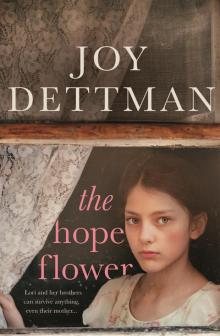 The Hope Flower
The Hope Flower Trails in the Dust
Trails in the Dust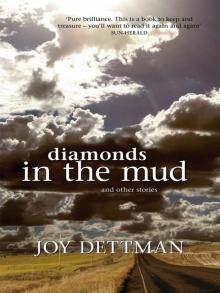 Diamonds in the Mud and Other Stories
Diamonds in the Mud and Other Stories Moth to the Flame
Moth to the Flame The Tying of Threads
The Tying of Threads Wind in the Wires
Wind in the Wires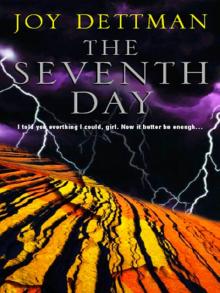 The Seventh Day
The Seventh Day Thorn on the Rose
Thorn on the Rose Jacaranda Blue
Jacaranda Blue Mallawindy
Mallawindy Ripples on a Pond
Ripples on a Pond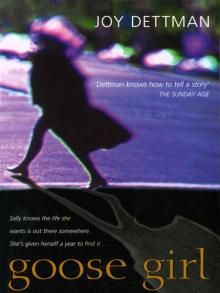 Goose Girl
Goose Girl The Silent Inheritance
The Silent Inheritance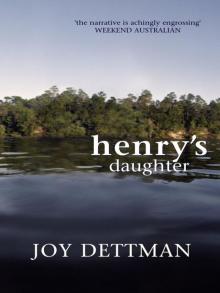 Henry’s Daughter
Henry’s Daughter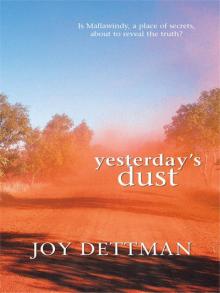 Yesterday's Dust
Yesterday's Dust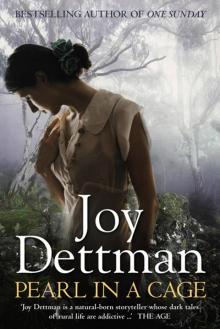 Pearl in a Cage
Pearl in a Cage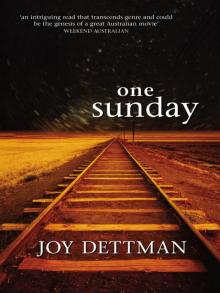 One Sunday
One Sunday